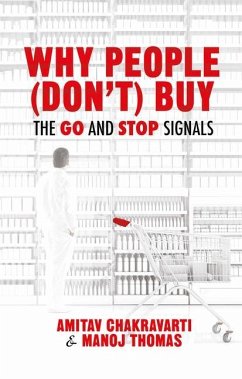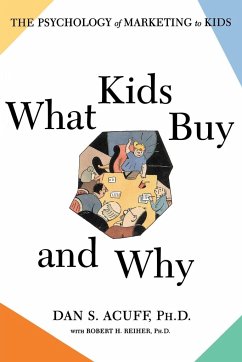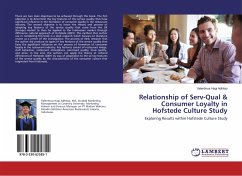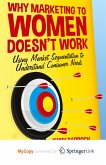- Broschiertes Buch
- Merkliste
- Auf die Merkliste
- Bewerten Bewerten
- Teilen
- Produkt teilen
- Produkterinnerung
- Produkterinnerung
Full of practical diagrams and maps, as well as international case studies, this book offers a unique and extensively-tested 'GO-STOP Signal Framework', which allows managers to better understand why consumers are not buying their products and what can be done to put this right.
Andere Kunden interessierten sich auch für
![What Kids Buy and Why What Kids Buy and Why]() Dan S. AcuffWhat Kids Buy and Why22,99 €
Dan S. AcuffWhat Kids Buy and Why22,99 €![Why do Belgian consumers buy fair trade products... and why not? Why do Belgian consumers buy fair trade products... and why not?]() Maxime DessyWhy do Belgian consumers buy fair trade products... and why not?18,95 €
Maxime DessyWhy do Belgian consumers buy fair trade products... and why not?18,95 €![Digital marketing strategy for a typical restaurant in Bogota Digital marketing strategy for a typical restaurant in Bogota]() Juan Camilo RiañoDigital marketing strategy for a typical restaurant in Bogota29,99 €
Juan Camilo RiañoDigital marketing strategy for a typical restaurant in Bogota29,99 €![Relationship of Serv-Qual & Consumer Loyalty in Hofstede Culture Study Relationship of Serv-Qual & Consumer Loyalty in Hofstede Culture Study]() Valentinus Hagi AdhityoRelationship of Serv-Qual & Consumer Loyalty in Hofstede Culture Study21,99 €
Valentinus Hagi AdhityoRelationship of Serv-Qual & Consumer Loyalty in Hofstede Culture Study21,99 €![Why Marketing to Women Doesn't Work Why Marketing to Women Doesn't Work]() J. DarrochWhy Marketing to Women Doesn't Work51,99 €
J. DarrochWhy Marketing to Women Doesn't Work51,99 €![Why Marketing to Women Doesn't Work Why Marketing to Women Doesn't Work]() J. DarrochWhy Marketing to Women Doesn't Work28,99 €
J. DarrochWhy Marketing to Women Doesn't Work28,99 €![Konzept Hummer Konzept Hummer]() Andreas J.H. HeinKonzept Hummer12,80 €
Andreas J.H. HeinKonzept Hummer12,80 €-
-
-
Full of practical diagrams and maps, as well as international case studies, this book offers a unique and extensively-tested 'GO-STOP Signal Framework', which allows managers to better understand why consumers are not buying their products and what can be done to put this right.
Produktdetails
- Produktdetails
- Verlag: Palgrave Macmillan / Palgrave Macmillan UK / Springer, Berlin
- Artikelnr. des Verlages: 978-1-349-49987-8
- 1st ed. 2015
- Seitenzahl: 240
- Erscheinungstermin: 13. April 2016
- Englisch
- Abmessung: 216mm x 140mm x 14mm
- Gewicht: 308g
- ISBN-13: 9781349499878
- ISBN-10: 1349499870
- Artikelnr.: 45756555
- Herstellerkennzeichnung Die Herstellerinformationen sind derzeit nicht verfügbar.
- Verlag: Palgrave Macmillan / Palgrave Macmillan UK / Springer, Berlin
- Artikelnr. des Verlages: 978-1-349-49987-8
- 1st ed. 2015
- Seitenzahl: 240
- Erscheinungstermin: 13. April 2016
- Englisch
- Abmessung: 216mm x 140mm x 14mm
- Gewicht: 308g
- ISBN-13: 9781349499878
- ISBN-10: 1349499870
- Artikelnr.: 45756555
- Herstellerkennzeichnung Die Herstellerinformationen sind derzeit nicht verfügbar.
Amitav Chakravarti is Professor of Marketing at the Department of Management, London School of Economics and Political Science, and wrote part of the book when visiting the Sloan School of Management, MIT. Currently he is on the faculty of University of California, Riverside. Prior to his appointment at LSE, he was an Associate Professor at the Stern School of Business, New York University. He received his PhD from the University of Florida (Go Gators!) and his research has been published in leading journals like Journal of Marketing Research, Journal of Consumer Research, Journal of Consumer Psychology, and Journal of Experimental Psychology: Learning, Memory, and Cognition. He was awarded the Google-WPP Marketing Research Award and the Marketing Science Institute (MSI) Young Scholar Award, and named among the 'Top 10' instructors at the Department of Management, LSE. Chakravarti spends a lot of his time in the concrete jungles of New York City, but still misses his childhood days growing up near a Rhino reserve. Manoj Thomas is Associate Professor of Marketing and Director of Business Simulation Lab at the Samuel Curtis Johnson Graduate School of Management at Cornell University. He trains MBA students and executives to identify and test powerful consumer insights. Thomas has received the Apple Award for Excellence in Teaching. He holds a PhD in marketing from the Stern School of Business at New York University. His specialization is consumer psychology. His research has been published in the Journal of Consumer Research , the Journal of Marketing Research , Marketing Science and Psychological Science . Thomas has received several research fellowships, has been nominated an MSI Young Scholar, and is an Associate Editor for the Journal of Consumer Psychology. He lives in the idyllic town of Ithaca, NY with his charming wife and two sons.
1. THE 100 CALORIES PARADOX The GO-STOP Signal Framework 2. JC PENNEY: THE FAIR AND SQUARE STRATEGY Removing Price Promotions Can Strengthen the STOP signal 3. TATA NANO: THE CHEAPEST CAR Low Price Can Weaken the GO Signal 4. HEDGEHOGS AND FOXES Mispredicting Consumer Behavior 5. UNDER-PRICED NYC RESTAURANTS When Does Low Price Weaken the GO Signal? 6. DID CREDIT CARDS MAKE AMERICA FAT? Unintended Consequences of Technology 7. IS $451,563 SMALLER THAN $450,000? Heuristic Inferences 8. PAYING FOR MEDICINES AND TICKLE-ME ELMO Unfairness Cues Strengthen the STOP Signal 9. WHY PAYING PEOPLE TO DONATE BLOOD DOESN'T PAY Monetary Incentives Can Weaken the GO Signal 10. BEHAVIORAL AUDIT FOR STRATEGIC DECISIONS Measuring GO AND STOP signals
1. THE 100 CALORIES PARADOX The GO-STOP Signal Framework 2. JC PENNEY: THE FAIR AND SQUARE STRATEGY Removing Price Promotions Can Strengthen the STOP signal 3. TATA NANO: THE CHEAPEST CAR Low Price Can Weaken the GO Signal 4. HEDGEHOGS AND FOXES Mispredicting Consumer Behavior 5. UNDER-PRICED NYC RESTAURANTS When Does Low Price Weaken the GO Signal? 6. DID CREDIT CARDS MAKE AMERICA FAT? Unintended Consequences of Technology 7. IS $451,563 SMALLER THAN $450,000? Heuristic Inferences 8. PAYING FOR MEDICINES AND TICKLE-ME ELMO Unfairness Cues Strengthen the STOP Signal 9. WHY PAYING PEOPLE TO DONATE BLOOD DOESN'T PAY Monetary Incentives Can Weaken the GO Signal 10. BEHAVIORAL AUDIT FOR STRATEGIC DECISIONS Measuring GO AND STOP signals








